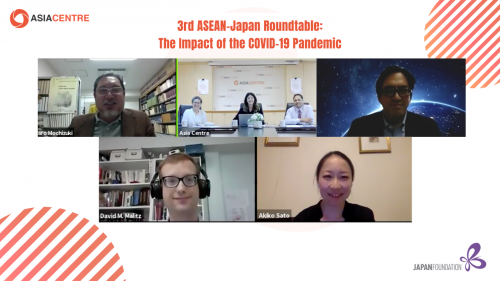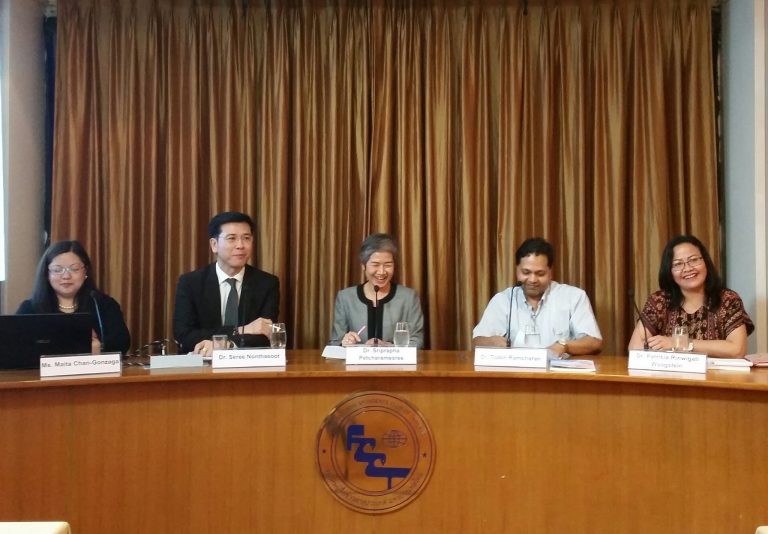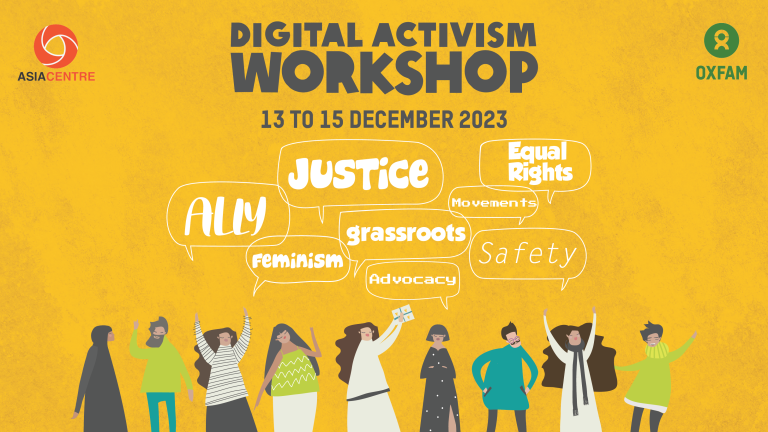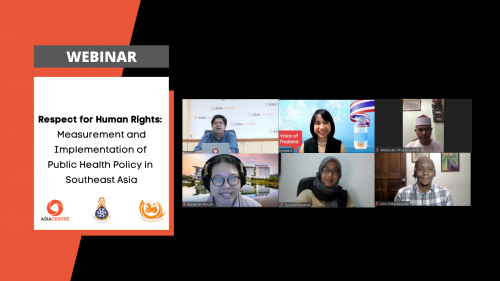
The COVID-19 related infodemic in Southeast Asia is affecting access to accurate information. This is in part caused by the implementation of the government’s public health policies for the pandemic. Censorship of information on the COVID-19 situation, propaganda from state-sponsored media to spin a positive image of the government and other policies are the key causes of disinformation.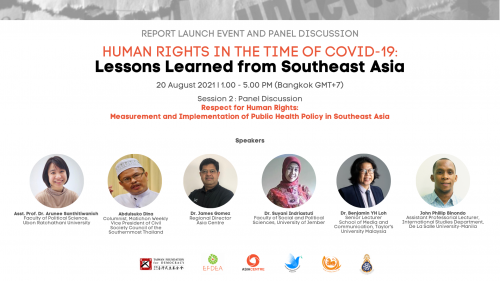
This was the major view that emerged from speakers of session two’s panel discussion, “Respect for Human Rights: Measurement and Implementation of Public Health Policy in Southeast Asia”. Six presenters from Indonesia, Malaysia, Philippines, Singapore, Thailand and Southern Thailand provided their insights on the situation.
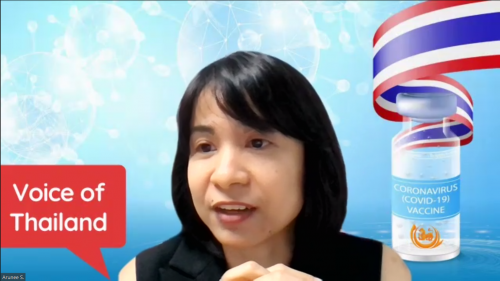 Dr. Arunee Santhitiwanich, Assistant Professor at the Faculty of Political Science, Ubon Ratchathani University, observed that the Thai government responded to the infodemic through the use of emergency legislation. Laws were used as tools to restrict access to content over the internet and the media. Human rights activists criticising the work of the ministry of interior’s COVID-19 center were prosecuted. This has increased distrust of government information as inequality in vaccine distribution, healthcare treatment and the overall ineffective management of the pandemic continues.
Dr. Arunee Santhitiwanich, Assistant Professor at the Faculty of Political Science, Ubon Ratchathani University, observed that the Thai government responded to the infodemic through the use of emergency legislation. Laws were used as tools to restrict access to content over the internet and the media. Human rights activists criticising the work of the ministry of interior’s COVID-19 center were prosecuted. This has increased distrust of government information as inequality in vaccine distribution, healthcare treatment and the overall ineffective management of the pandemic continues.
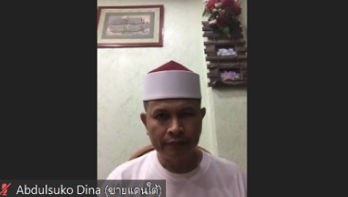 Abdulsuko Dina, Columnist at Matichon weekly and Vice-President of Civil Society Council of the Southernmost Thailand said a reform of the justice system is needed. There is a need to reconcile trust and reliability between the federal and the local government, which is the main cause of the infodemic in Southern Thailand. One suggestion he made was to decentralise the vaccine import process.
Abdulsuko Dina, Columnist at Matichon weekly and Vice-President of Civil Society Council of the Southernmost Thailand said a reform of the justice system is needed. There is a need to reconcile trust and reliability between the federal and the local government, which is the main cause of the infodemic in Southern Thailand. One suggestion he made was to decentralise the vaccine import process.
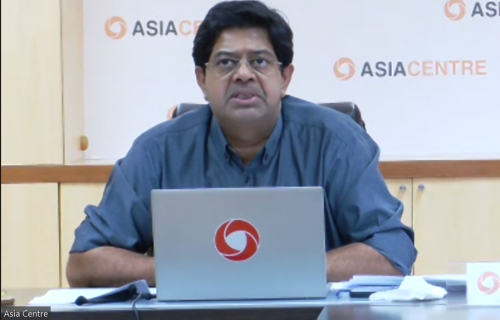 Dr. James Gomez, Regional Director at Asia Centre, highlighted the situation in Singapore where the healthcare policy implementation needs to account for the high number of foreigners. This has led to concerns among Singaporeans that they are being treated as second class citizens in their own country. Given the high rate of vaccinations, the debate centres upon the rights of the vaccinated and unvaccinated as the city-state opens up.
Dr. James Gomez, Regional Director at Asia Centre, highlighted the situation in Singapore where the healthcare policy implementation needs to account for the high number of foreigners. This has led to concerns among Singaporeans that they are being treated as second class citizens in their own country. Given the high rate of vaccinations, the debate centres upon the rights of the vaccinated and unvaccinated as the city-state opens up.
 Dr. Suyani Indriastuti from the Faculty of Social and Political Science, University of Jember, provided an insight into Indonesia. She noted the problem of data validation from separate sources of information indicate a difference in terms of statistics and reality, also pointing out the difference between culture and religion as they each influence compliance to health concerns differently.
Dr. Suyani Indriastuti from the Faculty of Social and Political Science, University of Jember, provided an insight into Indonesia. She noted the problem of data validation from separate sources of information indicate a difference in terms of statistics and reality, also pointing out the difference between culture and religion as they each influence compliance to health concerns differently.
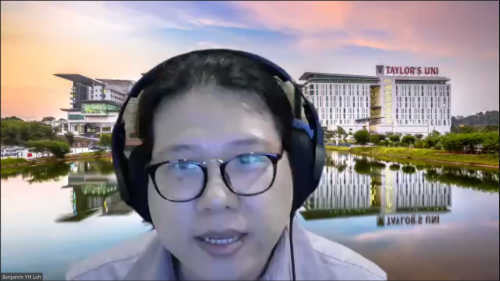 Dr. Benjamin YH Loh, Senior Lecturer at the School of Media and Communication, Taylor’s University Malaysia, explained the political instability in the country and its impact on the management of the COVID-19 pandemic. The lack of information on vaccinations has been the main cause of the influx, affecting vulnerable groups. Xenophobia has been directed at migrant workers and refugees, arising from misinformation that they are the primary virus carriers in the country.
Dr. Benjamin YH Loh, Senior Lecturer at the School of Media and Communication, Taylor’s University Malaysia, explained the political instability in the country and its impact on the management of the COVID-19 pandemic. The lack of information on vaccinations has been the main cause of the influx, affecting vulnerable groups. Xenophobia has been directed at migrant workers and refugees, arising from misinformation that they are the primary virus carriers in the country.
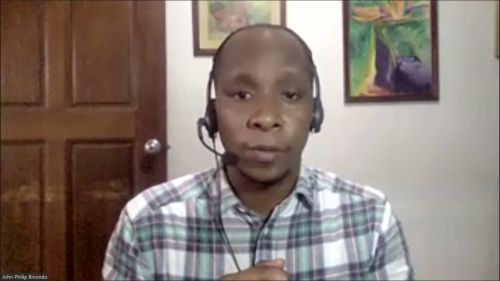 John Phillip Binondo, Assistant Professorial Lecturer, International Studies Department, De La Salle University-Manila, said the situation in the Philippines was confusing as many different regulation policies like the Enhanced Community Quarantine (EQC) and Modified Enhanced Community Quarantine (MECQ) had conflicting COVID-19 regulations. This served to cause confusion, rather than be a benefit to the Philippine population. Despite having experienced the longest community quarantine, the Philippines has continually suffered the consequences of such uncertain policy and unreliable communication. Effects of this have resulted in severe economic recession, social disruption and a reduction in the credibility of the Philippine governments.
John Phillip Binondo, Assistant Professorial Lecturer, International Studies Department, De La Salle University-Manila, said the situation in the Philippines was confusing as many different regulation policies like the Enhanced Community Quarantine (EQC) and Modified Enhanced Community Quarantine (MECQ) had conflicting COVID-19 regulations. This served to cause confusion, rather than be a benefit to the Philippine population. Despite having experienced the longest community quarantine, the Philippines has continually suffered the consequences of such uncertain policy and unreliable communication. Effects of this have resulted in severe economic recession, social disruption and a reduction in the credibility of the Philippine governments.
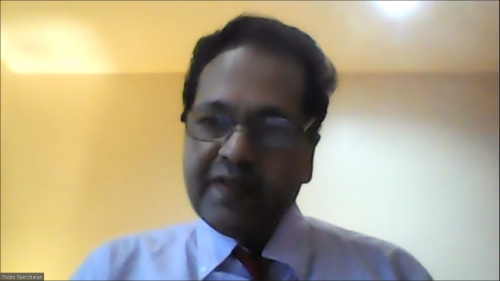
Pulling the discussion together, Dr. Robin Ramcharan, Executive Director at Asia Centre, summarised the lessons for Southeast Asia. He emphasised the need for increased information sharing between federal, local and civil society in order to deal with the infodemic. He also called for more cooperation between government and civil society to ensure the accessibility of accurate information in combating the COVID-19 infodemic. Governments are obligated to provide people with accurate and essential information, allowing criticism is absolutely necessary in fostering a transparent environment
There were several questions raised after the discussion. The full details of the panel discussion session can be viewed here.
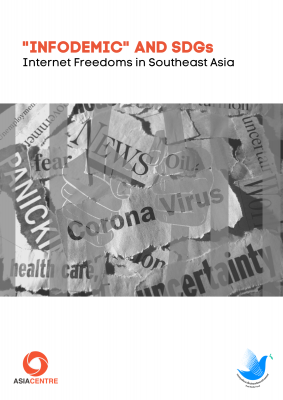 The panel discussion provided an opportunity to review the healthcare policies in Southeast Asia and their impact on accurate information during the COVID-19 pandemic. Combined with the presentation and discussion from session one “Infodemic and SDGs: Internet Freedoms in Southeast Asia”, it is clear that the COVID-19 infodemic has severely impacted internet freedoms and restricted access to accurate information.
The panel discussion provided an opportunity to review the healthcare policies in Southeast Asia and their impact on accurate information during the COVID-19 pandemic. Combined with the presentation and discussion from session one “Infodemic and SDGs: Internet Freedoms in Southeast Asia”, it is clear that the COVID-19 infodemic has severely impacted internet freedoms and restricted access to accurate information.
Asia Centre’s newly released report “Infodemic and SDGs: Internet Freedoms in Southeast Asia”, can be downloaded here and is the second Asia Centre report published in collaboration with the Thai Media Fund. The first report, “Hate Speech in Southeast Asia: New Forms, Old Rules” available here was published in July 2020 and was our first collaboration.
The first event writeup for session one of the event, a report launch entitled “Infodemic and SDGs: Internet Freedoms in Southeast Asia”, can be accessed here
Asia Centre works on issues related to freedom of expression. If you would like to collaborate with the Centre on evidence-based research, co-coveneing activities or other projects. Send an expression of interest to contact@asiacentre.org

